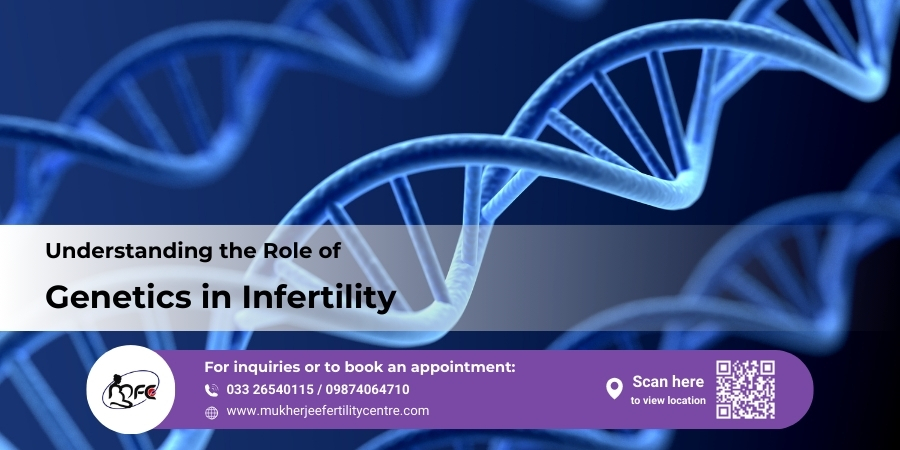
Understanding the Role of Genetics in Infertility | Causes & Testing
By MFC on 26,Mar 2025
Infertility affects millions worldwide, and genetics plays a crucial role in determining reproductive health. Understanding the genetic causes of infertility can help individuals explore testing options and seek appropriate treatments. This article delves into how genetic factors influence fertility, the hereditary nature of infertility, and the latest advancements in genetic testing for reproductive health.
Is Infertility Hereditary?
While not all infertility cases are genetic, research suggests that certain conditions affecting fertility can be inherited. Genetic mutations and chromosomal abnormalities can influence both male and female fertility, impacting the ability to conceive naturally.
Genetic Causes of Infertility in Females
- Syndrome: A chromosomal disorder where a female has only one X chromosome instead of two, leading to ovarian failure.
- Polycystic Ovary Syndrome (PCOS): Although not purely genetic, PCOS often runs in families and can lead to irregular ovulation.
- Endometriosis: Research indicates a hereditary component that may increase the risk of endometrial tissue growth outside the uterus.
- Fragile X Syndrome (FXS) Premutation: This genetic mutation can cause premature ovarian failure, leading to infertility.
Genetic Causes of Infertility in Males
- Klinefelter Syndrome: A condition where males have an extra X chromosome (XXY), leading to low testosterone and sperm production issues.
- Microdeletions: Missing genetic material on the Y chromosome can impair sperm production.
- Cystic Fibrosis (CF) Gene Mutations: Some men with CF have congenital absence of the vas deferens, preventing sperm from being transported.
- Androgen Insensitivity Syndrome: A condition where the body cannot respond to male hormones, affecting fertility.
What Causes Infertility? Genetic vs. Non-Genetic Factors
While genetic mutations can play a role, other factors such as age, lifestyle, infections, and hormonal imbalances also contribute to infertility.
Non-Genetic Causes of Infertility
- Imbalances: Thyroid disorders, diabetes, and prolactin imbalances can disrupt fertility.
- Lifestyle Choices: Smoking, excessive alcohol intake, and obesity impact reproductive health.
- Environmental Factors: Exposure to toxins and radiation can cause DNA damage affecting fertility.
Is Infertility Permanent?
Not all infertility cases are permanent. Many genetic conditions affecting fertility can be managed or treated with assisted reproductive technologies (ART) such as IVF, ICSI, and genetic screening.
Genetic Testing for Infertility
Genetic testing helps identify underlying genetic causes and guides fertility treatment plans. Some common tests include:
- Karyotyping: Identifies chromosomal abnormalities affecting fertility.
- Carrier Screening: Determines whether an individual carries gene mutations that could affect reproductive health.
- Y-Chromosome Deletion Testing: Detects deletions on the Y chromosome impacting sperm production.
- Genetic Counseling: Helps individuals understand the implications of genetic test results and explore treatment options.
Advancements in Genetic Research for Infertility
Recent studies explore gene therapy and personalized medicine to enhance fertility treatments. Preimplantation Genetic Testing (PGT) allows for the selection of embryos free from genetic disorders, increasing the chances of a successful pregnancy.
Why Choose Mukherjee Fertility Centre?
At Mukherjee Fertility Centre (MFC), led by Dr. Shiuli Mukherjee, we offer comprehensive genetic testing and personalized fertility treatments. Recognized as the Best IVF Centre in India, we specialize in advanced ART solutions, ensuring the highest success rates for our patients.
FAQs About Genetics and Infertility
- Is infertility hereditary in females?
- Is infertility hereditary in males?
- What are the 4 main causes of male infertility?
- What are the 4 main causes of female infertility?
- Can genetic testing help in treating infertility?
- Is infertility curable?
Yes, certain conditions like PCOS, endometriosis, and Turner syndrome can be inherited and affect fertility.
Some genetic disorders, such as Klinefelter syndrome and Y-chromosome microdeletions, can be passed down and impact male fertility.
The four primary causes include genetic mutations, hormonal imbalances, sperm production disorders, and structural abnormalities.
Key causes include ovulatory disorders, genetic abnormalities, endometriosis, and structural issues like blocked fallopian tubes.
Yes, genetic testing identifies hereditary conditions affecting fertility and helps in choosing the right treatment approach.
While not all cases are curable, many genetic and non-genetic infertility causes can be managed with the right medical interventions.
For expert fertility care, contact Mukherjee Fertility Centre at 9874064710 or 033 2654 0115 or visit our website for more information.








